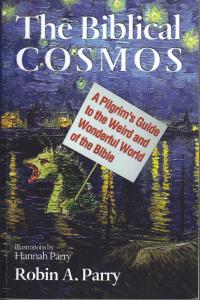 Robin A. Parry’s, The Biblical Cosmos: A Pilgrim’s Guide to the Weird and Wonderful World of the Bible is a fun trip through territory already familiar. Familiar, that is, to anyone who has studied the biblical world on its own terms. Fundamentalists, I think, would benefit from taking this guided tour seriously. The fact is, most people have no real sense of how mythology might inform a scientifically inclined world. Not that Parry will convince everyone, but the dangers of literalism are best disarmed by a believer. This little book endeavors to demonstrate just how odd a world produced the Bible we still use today.
Robin A. Parry’s, The Biblical Cosmos: A Pilgrim’s Guide to the Weird and Wonderful World of the Bible is a fun trip through territory already familiar. Familiar, that is, to anyone who has studied the biblical world on its own terms. Fundamentalists, I think, would benefit from taking this guided tour seriously. The fact is, most people have no real sense of how mythology might inform a scientifically inclined world. Not that Parry will convince everyone, but the dangers of literalism are best disarmed by a believer. This little book endeavors to demonstrate just how odd a world produced the Bible we still use today.
Although the point of the book may not be what I took away from it, I would suggest that the most important aspect is that times change. A biblical worldview, unless one is mentally able to hold two realities simultaneously in mind, is simply not possible today. I told generations of students that the world described by the Bible does not exist. It is a flat world, held up by pillars and with a solid bowl inverted over it for a sky. At the same time, those who lived in the biblical world were not simpletons. The basics of science were well understood and their engineering capacity easily bypassed that of the current writer. It was a world based on different assumptions than ours. The problem occurs when people who know better (i.e., anyone born since about the time of Copernicus) try to pretend that the Bible can be taken literally. It is disingenuous to say so. The Bible, regardless of divine status, is a document of its time. No dinosaurs had been discovered. The processes of geology were understood only in the most rudimentary of ways. Stars were not millions of light years away.
So what are we supposed to do with this information? Parry concludes his book by describing ways in which the biblical view of the cosmos might fit, conceptually, into a modern theology. For many of those starting out in the academic study of the Bible such a demonstration can be quite valuable. Those who’ve been at it a while will surely have come up with their own systems. When books become sacred, in the minds of the believing community, the “truth” attributed to the book is the truth of that era. As any scientist or historian will attest, truth is contingent. We haven’t learned everything yet. Given the limitations of the human mind, we likely never will. We should accept our universe with a little mystery. Humility can be a good thing, and it is more effective not having to make excuses for what will surely become outdated information sooner than we think.
